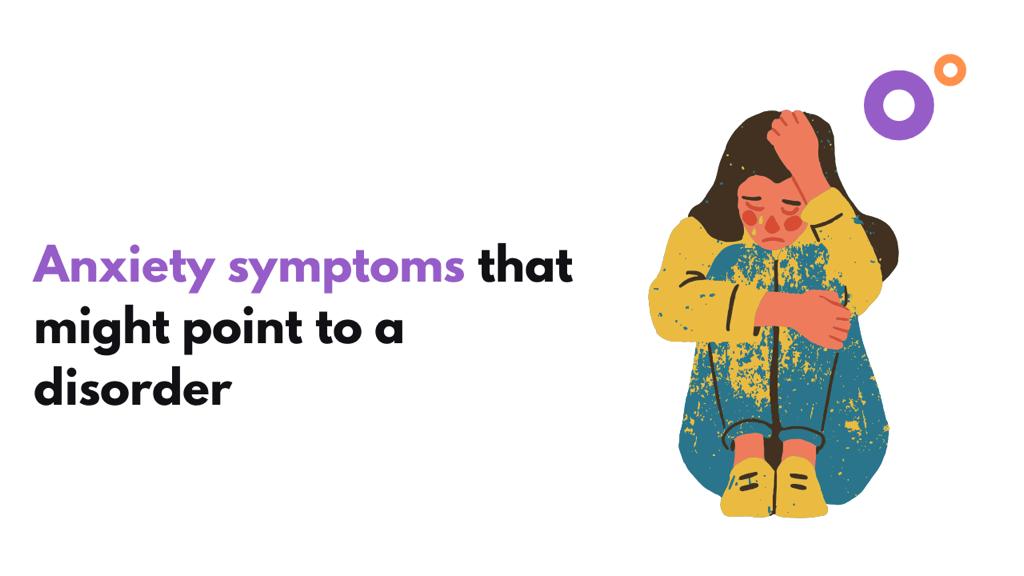
Anxiety symptoms that might point to a disorder
Everyone has an occasional bout of anxiety—maybe nervousness before an interview or a first date—this is not only normal but necessary for survival. Since the earliest days of civilization, humans on seeing predators or incoming danger experienced a reactionary response of ‘fight-or-flight’. This prepared humans to physically confront or flee any potential threats to safety. The alarms were in the form of a raised heartbeat, sweating or increased sensitivity to surroundings due to a rush of adrenaline (a hormone and chemical).
Anxieties in the current times revolve around work, money, family life, health and other crucial events involving a difficult situation. Anxiety makes us watch both sides rather than being hit by a car when crossing the street. Sometimes the duration or severity of an anxious feeling is out of proportion along with increased blood pressure and nausea; causing the responses to convert from mere anxiety into an anxiety disorder. This can interfere with day-to-day function.
WATCH OUT FOR
You need to visit a mental health professional for correct diagnosis if you are suffering from Generalized Anxiety Disorder (GAD) —here's what you need to know and watch out for so that you can seek professional help.
Excessive worry—
occasional worry about health, money or family problems is normal—but for those suffering from GAD, the worries are on a larger scale which don’t go away easily.They worry about those things even without a clear reason to worry. This anxiety is hard to control making it difficult for sufferers to focus on their daily tasks.Sleep problems—
adults normally need seven to nine hours of sleep every night—and stress and anxiety cause a problem in sleeping like falling or staying sleep;this is a sign that something is off. Decreased sleep can cause anxiety—or vice versa affecting the general health of the body. Talk with your doctor to determine the underlying causes and the corrective measures.Irrational fears—
at timesanxiety isn't generalized but linked to a specific situation or thing—like flying, animals or crowds. This is a sign of phobia; a type of anxiety disorder if this fear becomes overwhelming, disruptive and blows out of proportion.Muscle tension—
consisting of clenching jaw, balling fists or flexing muscles throughout the bodyconstantly—often accompanies anxiety disorders. People with persistent anxiety may stop noticing these symptoms. Tension flare-up can wreck these peoplemaking them incredibly restless and irritable.Chronic indigestion—
sometimes, anxiety can cause digestive issues like nausea, diarrhea and indigestion. Resolve these by taking deep breaths, regular exercise and following daily guided meditations. Seek help from a therapist who specializes in anxiety to come up with a treatment plan.Stage fright—
people usually get nervous before addressing a group or being in the spotlight. But if the fear is so strong that neither coaching nor practice alleviates it; you may have a form of social anxiety disorder (also known as social phobia).Self-consciousness—
is provoked by everyday situations, such as one-on-one conversation or eating and drinking in front of others as one feels self-conscious, as if all eyes are on them. They experience blushing, trembling, nausea, profuse sweating or difficulty in talkingwhich make it hard for them to meet new people, maintain relationships or shine out at work or in school.Panic attack—
are sudden, gripping feeling of fear and helplessness which last for several minutes, accompanied by breathing problems, a pounding or racing heart, tingling or numb hands, sweating, weakness or dizziness, chest pain, stomach pain and feeling hot or cold. These physical symptoms are due to the brain sending increased levels of cortisol and adrenaline throughout your body. People experience them repeatedly and fear when, where and why their next attack might happen.Flashbacks—
relive a disturbing or traumatic event—a violent encounter, death of a loved one—is a hallmark symptom of post-traumatic stress disorder (PTSD).Perfectionism—
obsessive mindset known as perfectionism ‘is similar to anxiety disorders’; if you judge yourself or have anxiety about making mistakes or falling short of your standards, then you have an anxiety disorder.Compulsive behaviors—
whether it's mental (telling yourself that it will be alright repeatedly) or physical (hand-washing, straightening items). Obsessive thinking and compulsive behavior become ‘rituals’—which drives your life.Self-doubt—
Persistent self-doubt may revolve around a question that is central to a person's identity or relationships, like "do I love my husband as much as he loves me? Or am I gay or straight". When these thoughts turn too persistent, it’s a disorder.These are just some of the symptoms that you might experience; and the above is just a guide not designed to provide a diagnosis – for that you'll need to visit a doctor.
Why talk to Us?
We at FirstCure have top doctors equipped with most advanced procedures at guranteed lowest cost. We will assist you at every step from booking consultations, second opinions, arranging diagnostic tests, insurance approvals and related paperwork, admission to discharge and post surgery follow up consultation.